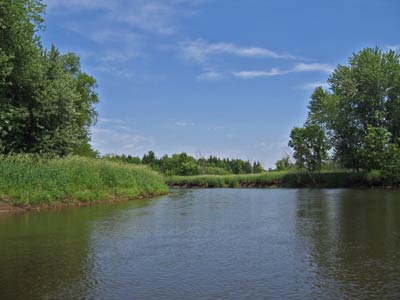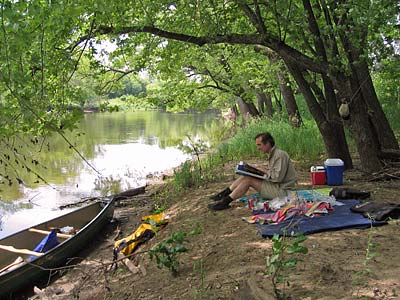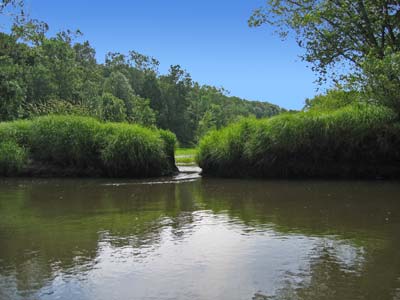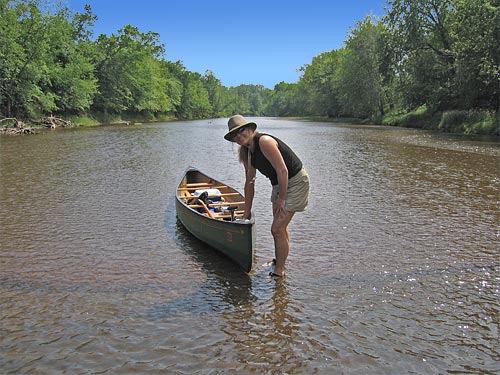

On a summer Friday Ian and I finally had the time to go in search of the Rum River, north of Minneapolis, and winding through tiny Cambridge, Minnesota, before emptying into the Mississippi. A huge storm system swept south of us, making the air so windy the giant Perkins flag stood straight out. But a 94 degree predicted temperature made us stir up the trees because the mosquitoes at the put-in were so intense they could have lifted us up and carried us off for slow eating later. We accomplished our shuttle from the take out, where we left our car, to the put in, with the help of these two guys, on break from the local Subway sandwich shop. Many thanks!

The Rum River is a prairie river and the site of several battles between the Chippewa and the Sioux. The river begins at Mille Lacs, great wild rice territory, and the rich marshland was often contested between the two tribes. Later, loggers used the stream to carry all the great pines down to the mills at Minneapolis. New growth forest line the banks, always disturbing — no old trees left anymore.
Sluggish and quiet, the river is now a paradise for birds. Big ones, little ones, darting and dashing, swooping and attacking — we saw them all. A huge bald eagle led us for awhile, and later a mysterious gigantic pair of wings swept over the canoe, larger than the eagle, leaving us to think that maybe an owl was unable to sleep through the heat and had taken to the river? We turned a bend in the river in the nick of time to avert a hawk’s swoop for a lagging duckling, the hawk startled by us as much as we were by it, the mother duck yelling at all of us. Birds wove songs across the river all day, back and forth, kingfisher and starling, and of course, the giant blue heron silently gliding and hiding, gliding and hiding, always just up ahead.

We stopped for lunch and drug out The Great Book of Archeology book we’ve been poring over of late. The ancient cities of Mesopotamia have caught our imaginations: Persepolis, Ur, and Babylon, all now crumbled stones in the desert, most abandoned due to enemy attack, or that other great quiet destroyer: rivers that dried up or turned elsewhere. (And this new book has led to my finding a new translation of the oldest written story, the text pieced together from clay tablet fragments found in the libraries of these great stone cities: Gilgamesh.)

Back on the river we passed several tiny openings in the riverbank grass, each offering a window into Minnesota’s famous wetlands. Once the river thinned out and we had to walk the canoe across a shallow sandbar, grateful to be in the water instead of on it. Waning afternoon light followed us the last of the fifteen mile paddle and we tied the canoe on the car as huge dark clouds accumulated to the west. On the drive home rain fell so hard the road flooded, traffic stopped, and thunder thundered. I thought about those ancient fallen cities, dry as bones, sand blowing, while the rain poured all over us. It rained like this, once, on those cities, too…
